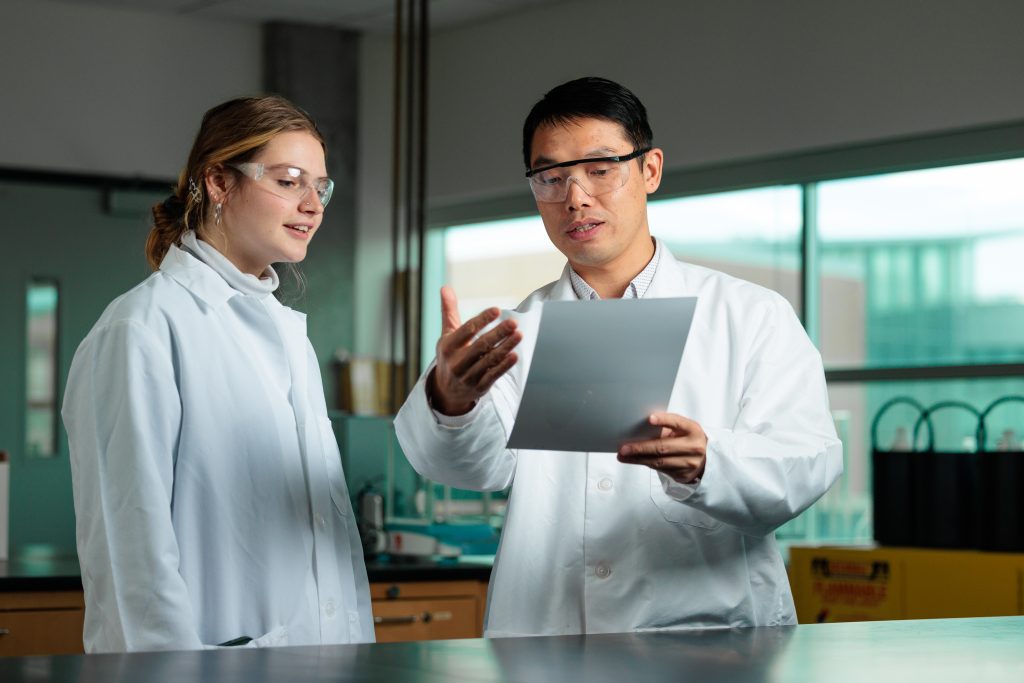Shan Jiang, associate professor in the Department of Materials Science and Engineering (MSE) is working to fill in the gaps that graduate students have after they leave school and enter academic or industry professions.
Started in 2019, Graduates for Advancing Professional Skills (GAPS) is an opportunity for graduate students to close the gap between academic research skills and what their future employer expects. It was born from Jiang’s desire to better equip students with real-world soft skills.
“It will benefit their career in the long run,” Jiang said. “Most of our students are well-trained with technical skills. However, they are missing some of the softer skills that is needed to succeed quickly in their career.”
The idea behind GAPS is to treat a graduate student’s thesis as a project management exercise. Charting out the big picture, with timetables and basic time management and communication skills that are worked on as a grad student goes through their thesis.
“It is a different type of research working in industry,” Jiang said. “A lot of Ph.D. students don’t know how to clearly communicate with management, and this program can bridge the gap between what grad students know and what industry is.”
The GAPS program is a collaborative effort with Gul Okudan-Kremer, Ann Gansemer-Topf, Nigel Reuel, Qing Li, and sponsored by an NSF IGE award; the active learning workshop is co-hosted with Monica Lamm, Aliye Karabulut-Ilgu, Evrim Baran through a Dean’s Excellence in Learning and Teaching Grant and an NSF IUSE HER award.
Active learning
This is just one of the many projects that Jiang has taken on since he started teaching at Iowa State after spending time in the public sector. His teaching style has evolved since he first took on the role of professor.
“I came to Iowa State, and thought I’d be good at teaching and enjoy it. I tried really hard, but the results were not good. I was really bad at teaching,” Jiang said with a chuckle.
After a hard and honest look at his teaching and his own education, Jiang decided to attend a National Effective Teaching Workshop that formed his current theories of teaching. The College of Engineering Dean’s Office sponsored and supported his effort.
“I drew a lot of inspiration from my own learning, and I knew I really learned science and tech when I tried to address problems in the lab,” Jiang said. “Classroom teaching becomes effective when it is combined with labs and real-world experience. You cannot separate those; it is an integral effort.”
He uses active learning with inductive teaching in his classrooms, with in-class discussions and gives immediate feedback.
“It is crucial to change the dynamic of the classroom and put students in the center and not the teachers,” Jiang said. “It is important to detect misconceptions in a student’s thinking as soon as possible.”
He does this by having in-class quizzes, short lecture times with lots of group discussions. He gives intriguing questions that foster students’ discussion and debate, challenging their knowledge.
He has perfected his methods so much over the last few years that he now runs an active learning workshop for faculty members.
“We have about 15 faculty members that participate, and the interesting thing is we use active learning to teach active learning,” Jiang said.
He hopes that his experience can help more of his faculty fellows to teach more effectively and enjoy their teaching time in the classroom.
Read more about the GAPS program in the Iowa State Daily.
